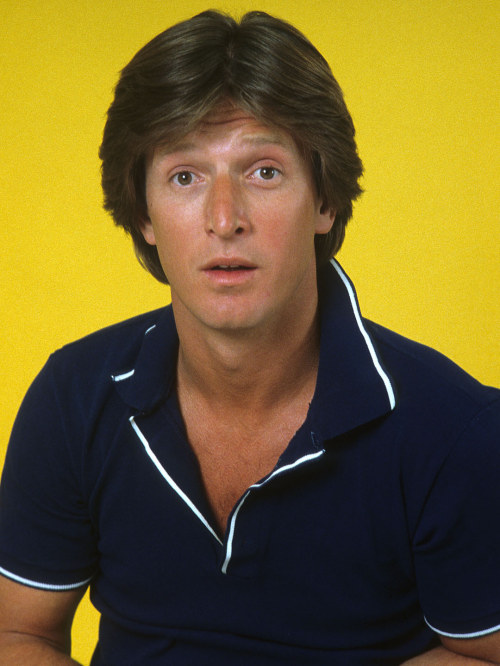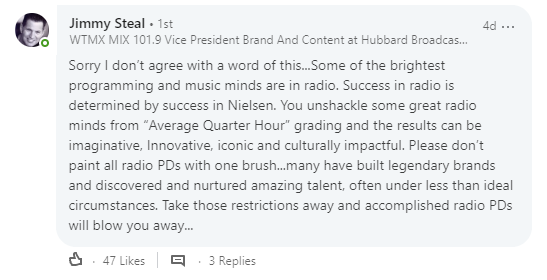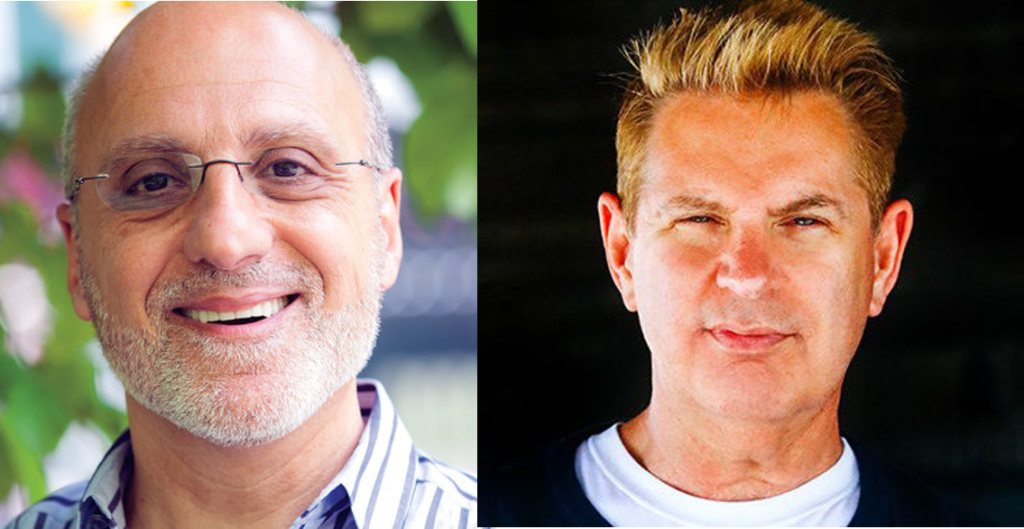 That look on Andy Travis’ face says it all about the rigors of radio programming. In case you don’t know, Andy is a fictional character – the PD of the famous “WKRP In Cincinnati” sitcom that had a nice run on CBS back in the ’80s. It’s a look that combines surprise with knowledge; with understanding but the realization there’s another impossible challenge just around the corner.
That look on Andy Travis’ face says it all about the rigors of radio programming. In case you don’t know, Andy is a fictional character – the PD of the famous “WKRP In Cincinnati” sitcom that had a nice run on CBS back in the ’80s. It’s a look that combines surprise with knowledge; with understanding but the realization there’s another impossible challenge just around the corner.
Andy was the peacemaker, the voice of reason, the guy who always had a vision for WKRP, despite the many distractions that afflict so many programmers – the bumbling GM, the amoral sales manager, difficult-to-manage air personalities – and the other stresses all part of what makes being the PD an often thankless job – but perhaps the best gig in radio because it’s the most creative and challenging.
Of course, in the real world of radio programming, Andy might struggle to keep up with the changes and the pressures. Not everyone who programmed in the WKRP Era is still plying their craft today in radio broadcasting. In fact, some are selling real estate, while some have sadly passed away.
But none of that changes the fact that being at the helm of a radio station in 2019 is still the toughest job in radio, if not in media. While other metrics are now very much in play throughout the entertainment and information ecosphere, the ratings pressure hasn’t subsided for radio programmers one iota.
So, while other programmers can boast of being commercial free with infinite playlist choices, radio PDs are in that tenuous position of having to achieve mass appeal success whether they’re in New York City or Nome.
And today, radio programmers are tasked with helping to generate revenue as well – even if their ratings are competitive or even stellar. And because they’re content creators, they are often responsible for what their brand is doing in social media, on their app, on smart speakers, podcasts, the website, and even with how their brand’s merch looks. Many are booking concerts and festivals, and they are responsible for keeping an intricate promotional matrix together, ensuring that talent, sales, and promotions are all doing their jobs.
That’s why a music industry news story – and a fascinating exchange on LinkedIn – caught my eye last week. It all started over the news that Spotify’s Head of Music, Nick Holmstén, was stepping down. Variety‘s Jem Aswad theorized Holmstén’s job had become too big – covering playlists, editorial, and artist relations. There’s been much turnover at Spotify, but that isn’t stopping the company from actively search for Holmstén’s replacement.
And that’s the news that led Allen Kovac, CEO of E7LG/Tenth Street Entertainment, to take to LinkedIn to offer up an opinion about the kind of person Spotify should be – and should not be – considering to take over Holmstén’s chair.
Here’s Kovac’s post:
Kovac’s plea to Spotify – whatever you do, don’t hire a radio PD – stirred up reaction, as you may have guessed. Some agreed with him, while others pushed back – in some cases, hard.
One of the most vocal – and thoughtful – reactions came from one of the best radio programmers in the business bar none – Jimmy Steal. He’s well-known in the industry, especially for his dynasty-building run at Power 106 in L.A. Jimmy is now leading the charge at Hubbard’s juggernaut in Chicago, WTMX – The Mix.
So, when Jimmy spoke up, it caught my attention:

In other words, great programmers can program…anything.
They walk into restaurants and wonder why that music is playing or why the most popular dishes aren’t better showcased on the menu. They watch cable news channels and moan about the lack of forward momentum and occasion setting. They attend weddings and Bar Mitzvahs and criticize the DJ’s choices and lame talk-ups.
That’s because every piece of content and the environment in which it lives should have a strategy, a purpose, a flow, a continuity – whether it’s a gas station, a car dealership, or a streaming music service. That’s what programmers think about.
And PDs are adaptable. Switch from diaries to meters, they’ll figure it out. Add a few units to make the quarter, they’ll find a way to squeeze them in. Make sure that remote is covered, they’ll find a way.
It also didn’t escape my attention – nor should it yours – that earlier this week, it was announced that veteran radio PD,  Alex Tear, had landed a new gig – VP/Music Curation and Programming for Pandora and SiriusXM. Not bad for a Top 40 commercial radio guy.
Alex Tear, had landed a new gig – VP/Music Curation and Programming for Pandora and SiriusXM. Not bad for a Top 40 commercial radio guy.
Here’s how his boss, Scott Greenstein, defines Tear’s new marching orders:
“(Tear will partner with programming teams to) further build Pandora’s listener base and maximize music assets across both the Pandora and SiriusXM platforms. More specifically, he will work closely with Pandora’s music genre leaders on refining top curated stations and playlists, and further defining strategy and execution of mood and activity programming along with new artist development.”
That’s nothing new, because that’s pretty much what Tear has done throughout his entire broadcasting career. And if a radio PD is good enough for Pandora, it makes you question Kovac’s premise that Spotify should be looking elsewhere.
And when he walks through the halls of SiriusXM (and now Pandora) in Manhattan, Tear will not be a stranger. The place is teeming with former radio broadcasting programmers and marketers who seamlessly adapted to satellite radio.

A look at other tech companies reveals scores of other former programmers, including Alex Luke (Amazon), Suzy Cole (Apple), Kevin Stapleford (Slacker), and many, many others.
And let’s not forget the early days of MTV and Vh1 were guided by former radio programmers; visionaries like Bob Pittman, Jarl Mohn (Lee Masters), and Jeff Rowe (Dallas Cole).
That because great programmers just program. Look inside the brains of Alex Tear, Terrie Carr, Dave Richards, Mike Thomas, or Jimmy Steal and you’ll find essentially the same neurons.
These pros have similar skill sets – they know how to build audiences, they “get” the essence of entertaining, and they know a thing or two about brand building – almost always in a challenging, changing environment.
With passion.
Haters gonna hate.
Radio programmers gonna program.
Spotify could do a lot worse.
Our condolences to the family, friends, and co-workers of Ron Stryker, PD of Federated Media’s The Bear in South Bend. I met Ron back in the ’90s – a good guy and a dedicated radio programmer.
- What To Do If Your Radio Station Goes Through A Midlife Crisis - April 25, 2025
- A 2020 Lesson?It Could All Be Gone In A Flash - April 24, 2025
- How AI Can Give Radio Personalities More…PERSONALITY - April 23, 2025




I can predict one thing about whoever succeeds Nick Holmstén: He/she likely won’t also do a full-time airshift, production, promotion, go on sales calls, update the website, etc., etc. So many of today’s radio PDs are responsible for all that and a lot more. The requirements I read in today’s PD job solicits boggle the mind.
At my last gig, I programmed the news/talk station, served as the news director and anchored newscasts for four stations, managed and provided content for six websites, co-hosted a morning show, voice tracked mid-days for a classic hits station, produced spots/digital ads, and did remotes.
Steven, just reading your comment made me reach for the Xanax.
Agree agree agree.
Well stated Harvey. In my case programming 3 stations (2 of which include daily music logs), doing 7 Voice tracked shows and 5 live shows per week, starring in “Deal of The Week’ videos, talent care and feeding, production, remotes, FB content, handling concert accounts, ratings analysis, community out reach, promotions, marketing and sales coordination. Best job in the world.
Brew, you forgot all those three-hour record company lunches.
Loved reading today’s blog Fred. Jimmy Steal’s comments are right-on. I know so many programmers who are exceptionally creative. The really good ones are resourceful and figure out how to entertain and yet play the “ratings game.” Allen is a brilliant and successful man. It is fair to say that he’s not walked a mile in the moccasins of those that he criticizes. Unfortunately, too many believe what he said. Our actions need to speak louder than words and we need to congratulate and salute those who continue to evolve and improve radio. Every market has at least one. Maybe more.
Agree, Mike, and your vantage point as a consultant for so many years, and then heading up all those radio stations at Cumulus put you in touch with some of the best in the biz. I’m similarly blessed. Programming has become so much more intricate, difficult, and challenging since the days I sat in the chair. I wish more people in the industry knew just how hard-working and talented they truly are. Thanks for those thoughts.
Oh boy, that’s the kind of talk I like. There was – and is – so much talent in our business fighting to be heard. Each of the radio programmers mentioned, and the others like them, have two things in common.
1. They are high performers at creating and directing the myriad of elements that combine to make great radio.
2. They are magicians at juggling, bobbing and weaving, asking permission later, finding work arounds, avoiding distractions and barriers thrown before them by numbskulls who don’t know what makes great radio.
Oh, and, they are excellent jocks/hosts who get it. When one of these programmers “fails,” it is 90% likely that they never were given an open road to get there.
Bobby, I couldn’t have said it better. I love those “two things.” Thanks for the comment.
If all a PD can do is program music, then his/her usefulness is over. Pandora, Iheart, YouTube, XM, Ipods, etc….already have you beat.
Put it this way. When a competitive service called TV came around full force in the 1950’s, radio broadcasters didn’t continue to program soap operas, dramas, variety shows and live big bands….they adapted and changed to find an available audience.
Adapt or go the way of the T-Rex. Thanks for the comment, Don.